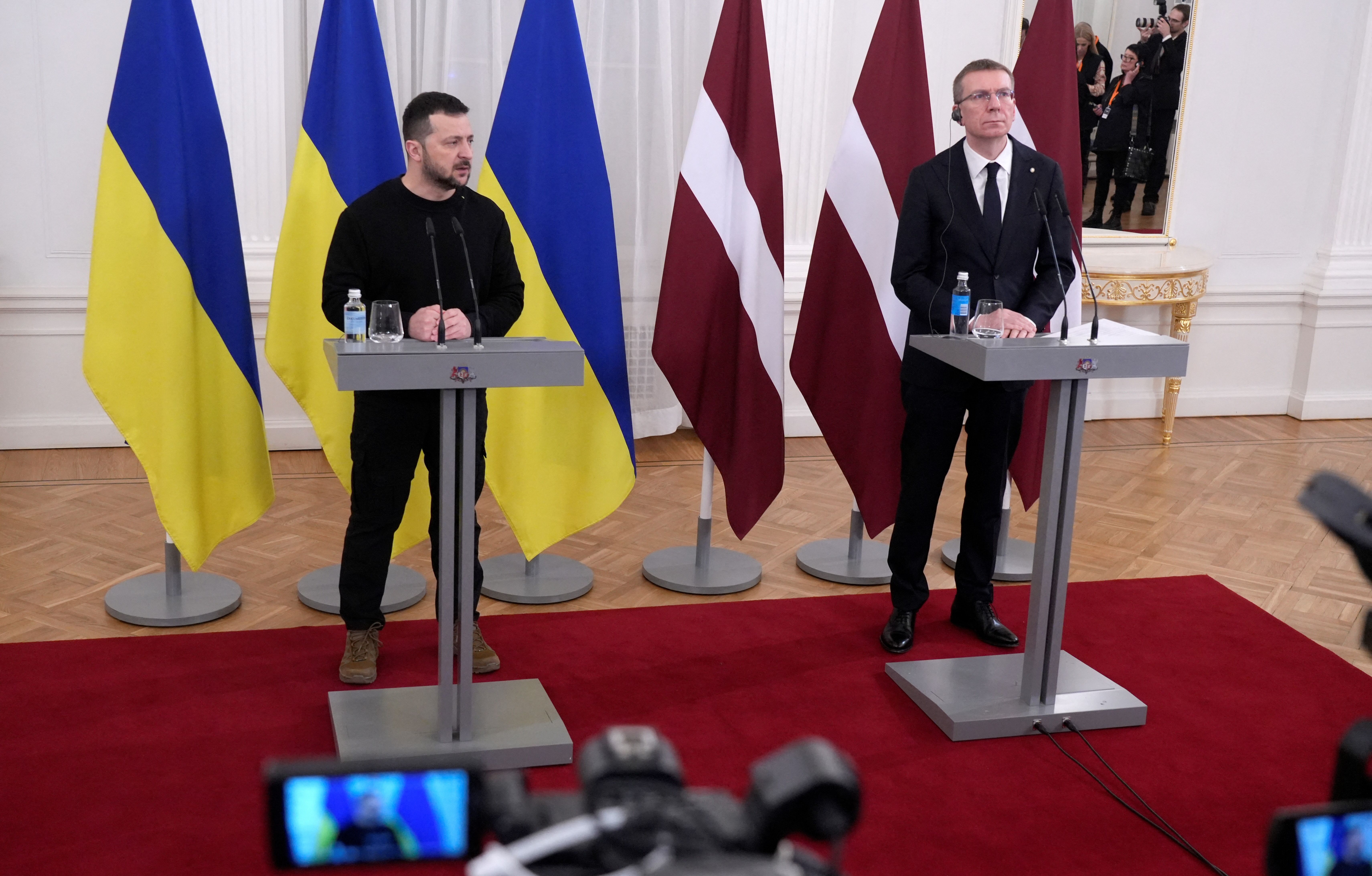When the presumptive Republican nominee for the U.S. presidency Donald Trump threatened that he would withdraw NATO protection from delinquent allies (i.e. those who do not invest enough in their own defense), his words drew widespread condemnation. Yet some of America’s European allies are not doing their cause any favors.
On March 15, Latvia’s President Edgars Rinkēvičs expressed his “full support” for French President Emmanuel Macron’s hawkish stance toward Moscow, saying “we should not draw red lines for ourselves, we must draw red lines for Russia and we should not be afraid to enforce them.” Rinkēvičs failed to specify what these red lines were, but presumably, he referred to Macron’s hints at a possibility of sending NATO troops to fight Russia in Ukraine.
This kind of rhetoric is a standard fare in European politicians’ speeches, particularly those leaders from Central and Eastern European countries. It has an advantage of projecting resolve while being sufficiently vague about what exactly would qualify as Ukraine’s victory and Russia’s defeat. But Rinkēvičs upped the ante by adding this phrase in Latin: “Russia delenda est.”
“Delenda est” is a phrase used by Cato, a politician of the Roman Republic with respect to Carthago (Carthago delenda est) which is translated as “Carthago must be destroyed.” While some may interpret Rinkēvičs’s choice of words as an exhortation to steadfastly fight the enemy — Russia — it is reasonable to suggest that most people would take the phrase more literally: as a call to destroy, not just fight an enemy, in this case Russia.
Certainly, this is how this call was perceived in Moscow: former president and current deputy chairman of the Security Council of Russia Dmitry Medvedev, true to form, responded with a volley of aggressive insults against Rinkēvičs and Latvia, calling him “a Nazi bastard,” his country “non-existent” and promising an “inevitable retribution.”
It would be tempting to dismiss Medvedev’s unhinged verbiage as a desperate attempt to over-compensate for his once upon a time reputation as a relative dove. However, what the European politicians should consider is how their rhetoric is perceived by their allies in Washington at a time when there are tentative signs of a U.S. retrenchment from its omnipresent, hyper-activist global role. That is certainly even more true in the case of the Baltic states whose security depends almost entirely on American willingness to come to their aid should they be attacked. It is not clear whether Rinkēvičs fully gauged the impact his rhetoric might have on his most powerful ally.
Elbridge Colby, a former Trump administration official, widely seen as a strong candidate for a key national security position should Trump win again in November, pointed out, in reference to Rinkēvičs’s words, that “for Americans to contemplate risking nuclear war with Russia over exposed NATO allies, it is vital that the allied cause can be seen as rational, defensive, and sober.” It is inferred that calls to destroy Russia are none of these and even invite an escalation of nuclear tensions. At a time when one of the two main political parties in the U.S., and one with a fair chance to regain the White House, is growingly skeptical of a further U.S. support for Ukraine, entangling the U.S. in a direct, and quite possibly, catastrophic conflict with Russia is hardly an enticing prospect.
One plausible explanation for Rinkēvičs’s statement could be a fresh enthusiasm over Macron’s newly found hawkishness on Russia, including a prospect of a direct military intervention. But Macron himself has equivocated on this point by saying both that “perhaps at some point we’ll have to have operations on the ground to counter the Russian forces” and that he “won’t initiate it.”
France, however, can afford to play strategic ambiguity as it is largely a militarily self-sufficient state at a safe distance from Russia. The Baltic states, by contrast, should be wary of escalating rhetoric and goals in the conflict both because of their higher vulnerability to a potential Russian aggression and greater dependence on external support.
The sober and prudent assessment of the risks inherent in the present situation, however, seems to have been tossed aside in favor of a sterile moralist framing of the dilemmas facing the West. Macron set the tone by labeling those who disagreed with his newly combative stance as “cowards” — in a thinly-veiled reference to a more cautious German Chancellor Olaf Scholz. Estonia’s Prime Minister Kaja Kallas dismissed any restraint on the part of the West as a “trap of fear” that Putin sets against the allies to mask his own fear of war with NATO.
Putin may indeed have strong reasons to want to avoid a direct clash with NATO as, in a conventional sense, NATO’s capabilities are amply superior to those of Russia. But that is exactly the point: if cornered, Russia’s conventional inferiority may lower the bar for a first use nuclear strike. Acting upon a threat to “destroy” Russia would certainly risk making this possibility more real. Can the Baltic states be confident of Washington’s continued readiness to engage in a nuclear brinkmanship with Russia on their behalf if their own actions are seen as unnecessarily provocative?
We can keep helping Ukraine resist Russian aggression without embarking on a slippery slope of a misguided escalatory rhetoric.
- NATO boasts unity but potential for division lies ahead ›
- So if Europe wants to escalate against Russia who foots the bill? ›
- How to shore up democracy in Eastern Europe after the Ukraine war ›
- The 'we win, they lose' mentality is alive and well in Northern Europe | Responsible Statecraft ›
- Is the EU's new foreign policy chief in a useless job? | Responsible Statecraft ›
- Baltics' big bear hug of Israel is a strategic blunder | Responsible Statecraft ›
















